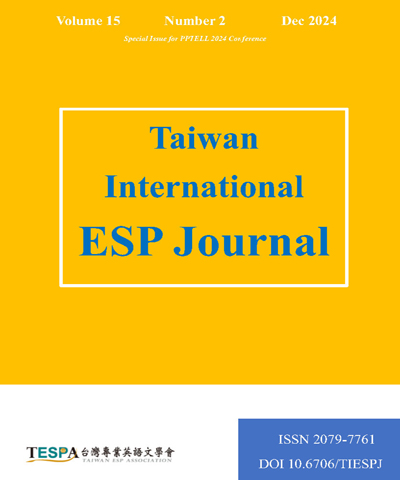
Taiwan International ESP Journal/台灣專業英語文期刊
- OpenAccess
台灣專業英語文學會,正常發行
選擇卷期
- 期刊
- OpenAccess
Given the rapid development of international business and the pervasiveness of intercultural communication in the era of global cooperation, English indisputably serves as a lingua franca (ELF) in business contexts around the world. Nevertheless, little research has been conducted on the analysis of English needs for working business professionals in the Taiwanese steel industry. The purpose of the present study is to investigate the tasks requiring English and related English skills needed in the business field in steel companies in Taiwan. In addition, some evidence-based pedagogical implications and guidelines are also offered for the implementation and design of English for specific business purposes (ESBP) courses. In accordance with the needs analysis methods employed from previous research, an online survey questionnaire containing rating scale questions and open-ended questions was developed for quantitative and qualitative data analysis. Results showed that regarding English skills used in the workplace, reading and writing skills are used with higher frequency and are considered to be more important, while communicative events that need listening and speaking skills are found to be more challenging. Findings also indicate that common communicative tasks include reading and writing emails, listening skills are required when receiving spoken instructions or advice, while speaking skills are needed for telephone and video conferencing communication. In addition, the study also identified cultural and linguistic challenges in business communications, including unfamiliar accented English and a lack of professional workplace terminology. In response to the problems, it is suggested that ESBP curriculum developers and course designers should develop learners' cultural awareness and ELF communication skills with authentic learning materials and tasks in real-life working contexts. Moreover, the incorporation of genre-specific training and corpus-based learning could also assist working business professionals in improving their English business communication skills.
- 期刊
- OpenAccess
The genre system of application for grants has begun to receive serious attention from researchers in Applied Linguistics, Discourse Studies, and Higher Education. An under-researched genre in this system is the grant recommendation letter (GRL) or 'letter of support' written by faculty on request to enable applicants to win research grants for their research. The aim of the study was to investigate the generic structure of a small corpus of 60 GRLs written by senior Ghanaian academics from selected Humanities and Sciences disciplines. The study revealed a six-move structure, with varying frequency distributions, sequences and textual space. These findings contribute to the scholarship on recommendation letters, in particular, and genre studies, in general. The findings also have implications for professional staff development programmes for faculty in universities in the area of writing such occluded genres as recommendation letters for grants.
- 期刊
- OpenAccess
The extensive range of purposes and contexts of the English language make English for Specific Purposes (ESP) an increasingly diverse field of study. English for Nursing is focused on teaching nurses how to use English in an educational and clinical setting. The area generally comes from the broader horizon of English for specific purposes, as it has grown enormously in importance. Although the English language is often quoted as the main hindrance to success in the medical profession, surprisingly, there has been little input from researchers to highlight the language learning needs of staff nurses. Therefore, the present study aimed to highlight the importance of analysing needs in English for Nursing Purposes and to explore how English Second Language teachers, nursing educators, and course developers investigated the needs of staff nurses and designed an English language course for nurses, midwives and other healthcare professionals. This study adopted a quantitative approach, collecting data from 126 staff nurses working in a private tertiary care hospital. The collected data were analysed using descriptive statistics. The results of this study indicated that the staff nurses' overall English language proficiency of speaking and writing skills was average, while their grammatical skills were below average. For productive skills, such as speaking and writing, prioritisation tables were developed based on the participants' deficiency analysis. The implications derived from the study highlight the importance of communication competence, the need for tailored language courses based on nurses' priorities, the active involvement of staff nurses and the collaborative interdisciplinary team-teaching approach in designing language courses. Incorporating these implications can enhance nurses' language skills, support their professional development, and create a more effective and relevant language-learning environment.

